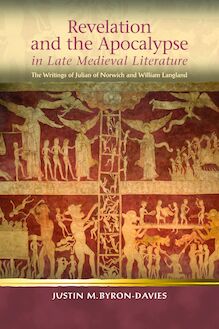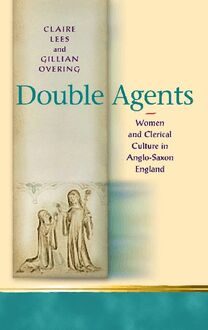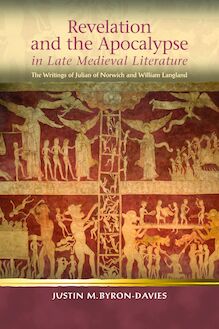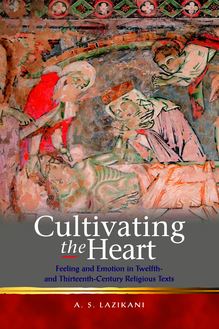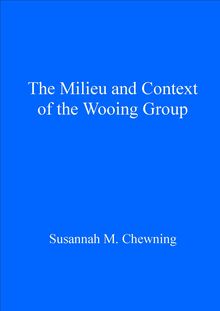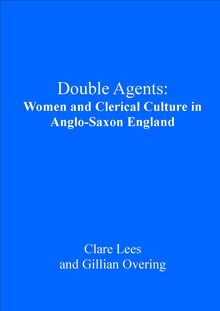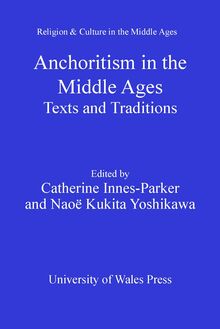An Introduction to the 'Glossa Ordinaria' as Medieval Hypertext , livre ebook
97
pages
English
Ebooks
2012
Vous pourrez modifier la taille du texte de cet ouvrage
Obtenez un accès à la bibliothèque pour le consulter en ligne En savoir plus
Découvre YouScribe en t'inscrivant gratuitement
Découvre YouScribe en t'inscrivant gratuitement
97
pages
English
Ebooks
2012
Vous pourrez modifier la taille du texte de cet ouvrage
Obtenez un accès à la bibliothèque pour le consulter en ligne En savoir plus
Publié par
Date de parution
05 janvier 2012
Nombre de lectures
0
EAN13
9781783165131
Langue
English
The Glossa Ordinaria, the medieval glossed Bible first printed in 1480/81, has been a rich source of biblical commentary for centuries. Circulated first in manuscript, the text is the Latin Vulgate Bible of St. Jerome with patristic commentary both in the margins and within the text itself.
Publié par
Date de parution
05 janvier 2012
Nombre de lectures
0
EAN13
9781783165131
Langue
English
RELIGION AND CULTURE IN THE MIDDLE AGES
An Introduction to the Glossa Ordinaria as Medieval Hypertext
Series Editors
Denis Renevey (University of Lausanne)
Diane Watt (University of Surrey)
Editorial Board
Miri Rubin (Queen Mary, University of London)
Jean-Claude Schmitt ( cole des Hautes tudes en Sciences Sociales, Paris)
Fiona Somerset (Duke University)
Christiania Whitehead (University of Warwick)
RELIGION AND CULTURE IN THE MIDDLE AGES
An Introduction to the Glossa Ordinaria as Medieval Hypertext
DAVID A. SALOMON
David A. Salomon, 2012
All rights reserved. No part of this book may be reproduced in any material form (including photocopying or storing it in any medium by electronic means and whether or not transiently or incidentally to some other use of this publication) without the written permission of the copyright owner. Applications for the copyright owner s written permission to reproduce any part of this publication should be addressed to the University of Wales Press, 10 Columbus Walk, Brigantine Place, Cardiff CF10 4UP.
www.uwp.co.uk
British Library CIP Data A catalogue record for this book is available from the British Library.
ISBN 978-0-7083-2493-6 (hardback) 978-0-7083-2494-3 (paperback) e-ISBN 978-1-78316-513-1
The right of David A. Salomon to be identified as author of this work has been asserted in accordance with sections 77 and 79 of the Copyright, Designs and Patents Act 1988.
Cover image: Page from the catena commentary on St Matthew in Thomas Aquinas, Catena Aurea, seu Continuum in Quattuor Evangelistas(Venice, 1486). By kind permission, Biblioteca Valenciana, Spain.
C ONTENTS
Series Editors Preface
List of Illustrations
Acknowledgements
Introduction
1 The Glossing Tradition and the Glossa Ordinaria
2 History, the Text, and the History of the Text
3 Reading, Theory, and Reading Theory
4 Reading the Glossa Ordinaria: Genesis 1:1, 3:1 and John 1:1
5 The Glossa Ordinaria and Hypertext
Notes
Bibliography
S ERIES E DITORS P REFACE
Religion and Culture in the Middle Ages aims to explore the interface between medieval religion and culture, with as broad an understanding of those terms as possible. It puts to the forefront studies which engage with works that significantly contributed to the shaping of medieval culture. However, it also gives attention to studies dealing with works that reflect and highlight aspects of medieval culture that have been neglected in the past by scholars of the medieval disciplines. For example, devotional works and the practice they infer illuminate our understanding of the medieval subject and its culture in remarkable ways, while studies of the material space designed and inhabited by medieval subjects yield new evidence on the period and the people who shaped it and lived in it. In the larger field of religion and culture, we also want to explore further the roles played by women as authors, readers and owners of books, thereby defining them more precisely as actors in the cultural field. The series as a whole investigates the European Middle Ages, from c.500 to c.1500. Our aim is to explore medieval religion and culture with the tools belonging to such disciplines as, among others, art history, philosophy, theology, history, musicology, the history of medicine, and literature. In particular, we would like to promote interdisciplinary studies, as we believe strongly that our modern understanding of the term applies fascinatingly well to a cultural period marked by a less tight confinement and categorization of its disciplines than the modern period. However, our only criterion is academic excellence, with the belief that the use of a large diversity of critical tools and theoretical approaches enables a deeper understanding of medieval culture. We want the series to reflect this diversity, as we believe that, as a collection of outstanding contributions, it offers a more subtle representation of a period that is marked by paradoxes and contradictions and which necessarily reflects diversity and difference, however difficult it may sometimes have proved for medieval culture to accept these notions.
I LLUSTRATIONS
1 Talmud Berakhot, Venice, 1520-3, fols. 46v-47r. Courtesy of the Library of the Jewish Theological Seminary.
2 Commentary on the Epistles of St Paul by Gilbert of Poitiers. France, mid-twelfth century. Manuscript: France, mid-twelfth century. Photo Victoria and Albert Museum, London.
3 Thomas Aquinas, Catena Aurea, seu Continuum in Quattuor Evangelistas (Venice, 1486). This work is part of the funds of the Biblioteca Valenciana and is digitized in the Biblioteca Valenciana Digital (BIVALDI) at http://www.bv.gva.es .
4 Biblia Sacra cum Glossa Ordinaria . . . et Annotationibus de Nicolaus a Lyra, 2A1v, published in Venice, 1588 edition. Reproduced by permission of the Huntington Library, San Marino, California.
5 Biblia Latina cum Glossa Ordinaria: Facsimile Reprint of the Editio Princeps Adolph Rusch of Strassburg 1480/81, Introduction by Karlfried Froehlich and Margaret T. Gibson (1992). Photo courtesy of Brepols Publishers, Turnhout, Belgium.
A CKNOWLEDGEMENTS
In Letters to a Young Poet, Rainer Maria Rilke writes, Everything is gestation and then bringing forth. To let each impression and each germ of a feeling come to completion quite in itself, in the dark, in the inexpressible, the unconscious, beyond the reach of one s own understanding, and await with deep humility and patience the birth-hour of a new clarity: that alone is living the artist s life - in understanding as in work. Although its seeds were first planted in 1998, this book has had a long period of gestation. My interest in the margins of religious literature began with my doctoral dissertation on the Jesuit Robert Parsons s Christian Directory and its relationship to contemporary English Catholic spirituality in the late sixteenth century. While working on that book, and after reading her outstanding The Voice of My Beloved: The Song of Songs in Western Medieval Christianity, I invited the distinguished religious studies scholar, E. Ann Matter, to the University of Connecticut to give a lecture; she was, at the time, working on a study of the Church Fathers and the Glossa Ordinaria, and opened my eyes to this astonishingly rich work of the Middle Ages. I am grateful to her for her friendship, her guidance and her many insights. I also thank the editors of the University of Wales Press and the founders of its Religion, Culture and Society series for their patience as I switched positions, moved across country and started a family; I would especially like to thank Sarah Lewis and Dafydd Jones of the press for their guidance and shepherding of this study into print. I also acknowledge Susannah Chewning, who first made me aware of this exciting series.
I have been fortunate to have had a series of incomparable professors, beginning with the late Duane Edwards at Fairleigh Dickinson University, continuing with Angus Fletcher at the City University of New York and concluding with Thomas Jambeck at the University of Connecticut. I have received so much from each of these men, but I would like particularly to thank Tom Jambeck, from whom I have learnt the value of intellectual patience, academic and personal integrity and professional steadfastness. From all of my instructors I have gained insight into the life of the academic, a life I have embraced, loved and viewed as mine only to safeguard for a short time. As such, I have treated that life with the respect and honour it is due. My scholarly pursuits have always been grounded in intellectual curiosity, respect, and amazement, particularly as a Jew studying the history of Christianity and the Church.
A series of students has both informed my work and assisted on this project, including four research assistants through the years: Katie (Carr) Kiger, Tina (Beguin) Van Kley, Liz Romero and Cara (Baummer) Forrest. My students continue not only to enhance and enrich my work, they also enrich my life. No work such as this can be accomplished without generous library support. Particularly, I thank Linda Allbee for hours of interlibrary loan assistance (in South Dakota) and for her continuing friendship. Amy Pass, at the Sage Libraries, is a great friend and colleague. I would like to thank the library staffs at the University of Connecticut, Black Hills State University, and the Sage Colleges for their expertise, their help and their understanding. Numerous scholars have graciously corresponded with me throughout the course of this study, offering both insight and advice; they include John Contreni, Theresa Gross-Diaz, E. Ann Matter and John O Donnell. My sincere thanks to the Harder-McClellan Chair in the Humanities at the Sage Colleges, which I held from 2007 to 2010 and which made some of this work s research and final publication possible.
I thank my colleagues at Russell Sage College, especially Jack Harris, Sybillyn Jennings, Deborah Lawrence and Sharon Robinson for their encouragement and collegiality. In addition, I acknowledge and appreciate the support of my colleagues in the Russell Sage College Department of English and Modern Languages. Thanks to Nancy Cumo, Natalie Farina, Amy Fuqua, Corey Jamison, Vincent King, Sally Lawrence, Henry Maas, Richard McCambly, Christine Mulford, Jeanne Neff and Terry Weiner
My parents, Robert and Sheila, and my siblings, Steven and Lynda, have always been supportive. Finally, my life is made complete by my wife, Kelly O Connor-Salomon, and my daughter, Phoebe. They are the central and guiding stars in my life, and it is to them that I dedicate this work.
I NTRODUCTION
Today s readers take certain things for granted. Book titles are explanatory. Authors names are clearly stated on title pages, as are publishers . Books are arranged in a certain order, clearly noted by page numbers printed somewhere on a given page. Books are often arranged by
